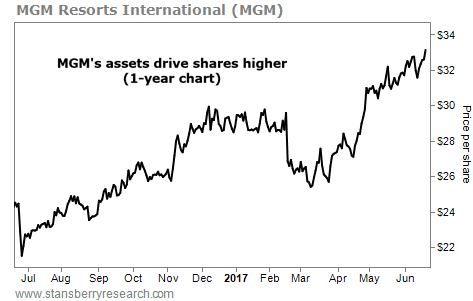| Home | About Us | Resources | Archive | Free Reports | Market Window |
Build This 'Foundation Fund' to Smooth out Life's SurprisesBy
Wednesday, June 21, 2017
The radio is playing as you drive down the road... You're thinking about your grocery list... And then, out of the blue, your car engine stutters and dies...
It's every car owner's most dreaded experience.
It happened to my assistant Laura last year. She put the key in the ignition... But the car wouldn't start. It sat there, a dead, 3,700-pound inconvenience.
It turned out several things went wrong at once with her 10-year-old car. Her total bill for the repairs, along with the tow service and renting a car for a full week, came to about $1,200.
Unexpected costs are part of life. But around 60% of Americans don't have enough in savings to cover even a $500 emergency. And the number that can't cover a $1,000 emergency expense is closer to 70%-80%!
Thankfully, Laura is in the minority. She has an emergency fund to lean on for exactly these kinds of unexpected bills...
I can't stress enough the importance of an emergency fund.
If you imagine your financial life as a house, an emergency fund should be the foundation. You want to make sure that in the event of an accident or job loss, you have the funds available to pay your expenses.
Typically, financial planners recommend having about three to six months' worth of take-home pay in your emergency fund. We've even seen some recommendations for as much as nine months' worth of pay saved.
Before subscribing to one of these simple rules of thumb, consider a few things before deciding how much is best for you...
Single folks with a reliable job don't need to save as much... But married folks where only one partner has a job (even a reliable one) should have more in savings. That's because in the event of a job loss, you'll have to pay bills for two folks instead of one. Married folks where both spouses have reliable jobs don't have as much risk.
If you don't know how much you spend per month, take time this week to sit down and figure it out. Include bills for your home (like rent or a mortgage, utilities, homeowners' association fees, property taxes, and insurance), as well as car payments, taxes, medical expenses, and living expenses (like groceries).
Some fields hire regularly, but others might not. Networking is a great way to increase your visibility, and keeping in touch with connections will help should you ever need to find a new job. Age can be a factor, too – although age discrimination is illegal, we know several folks 50 and older who've had difficulty finding a new job due to their age and being "overqualified."
Sudden problems like car or home repairs often require the use of an emergency fund. Some of the most common car or home repairs can add up to hundreds, even thousands of dollars. One important step is to understand exactly what your insurance will or will not cover. Likewise, know your warranty terms and how long they last.
According to the Kaiser Family Foundation, the average family health insurance plan deductible is about $1,500. Should a sudden accident or illness strike you or a family member, think about whether you could afford to cover the associated costs. A good solution for this is to open a Health Savings Account (HSA). If you aren't able to open an HSA, make sure to factor these costs into your emergency fund.
Once you calculate your emergency fund, you can start putting any leftover money to work in other investment accounts that can make you money.
Having a solid foundation is key to having a solid house. The same principle applies to your finances – start with an emergency fund and grow from there.
Here's to our health, wealth, and a great retirement,
Dr. David Eifrig
Further Reading:
Upping your savings rate is one of the most powerful things you can do to build wealth. Find out why, and learn a few simple tricks to get started saving more, right here: Wealth Grows on Its Own... But You Must Plant the Seeds.
"The first step to building wealth is not to increase your income," Dave writes. "The first step is to curb your spending." Before you can put your money to work, you must first save more. Learn why you don't need to cut back on what makes you happy here: The Rich Do Have a Secret.
Market NotesTHE BIG UPTREND IN 'DISNEYLAND FOR ADULTS' Today's chart highlights a powerful investing strategy...
Some companies own one-of-a-kind assets. This creates a competitive advantage that is almost impossible to replicate. These kinds of assets can bring in huge profits when managed properly. Porter Stansberry has written about this concept several times... He calls it "trophy asset" investing.
One of Porter's favorite examples is casino operator MGM Resorts International (MGM). MGM practically owns the Las Vegas strip. Its assets include 1.1 million square feet of casinos on the Vegas strip, another roughly 450,000 square feet of casinos located around the U.S., and 50% of the 300,000-plus square feet of MGM Macau. These are assets you can't simply go out and buy...
As you can see, MGM's shares are up around 35% over the past year... and recently hit a fresh multiyear high. With this company's premier position on the Las Vegas strip, it can keep raking in the cash for years to come. And its big uptrend will likely continue as adults flock to their version of Disneyland...
 |
Recent Articles
|


